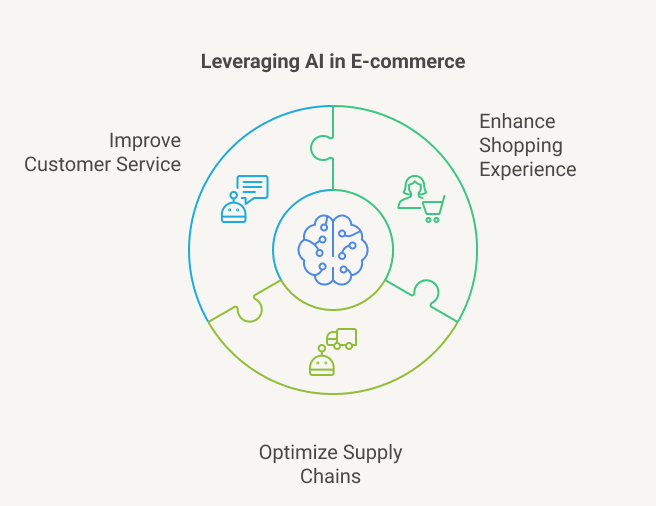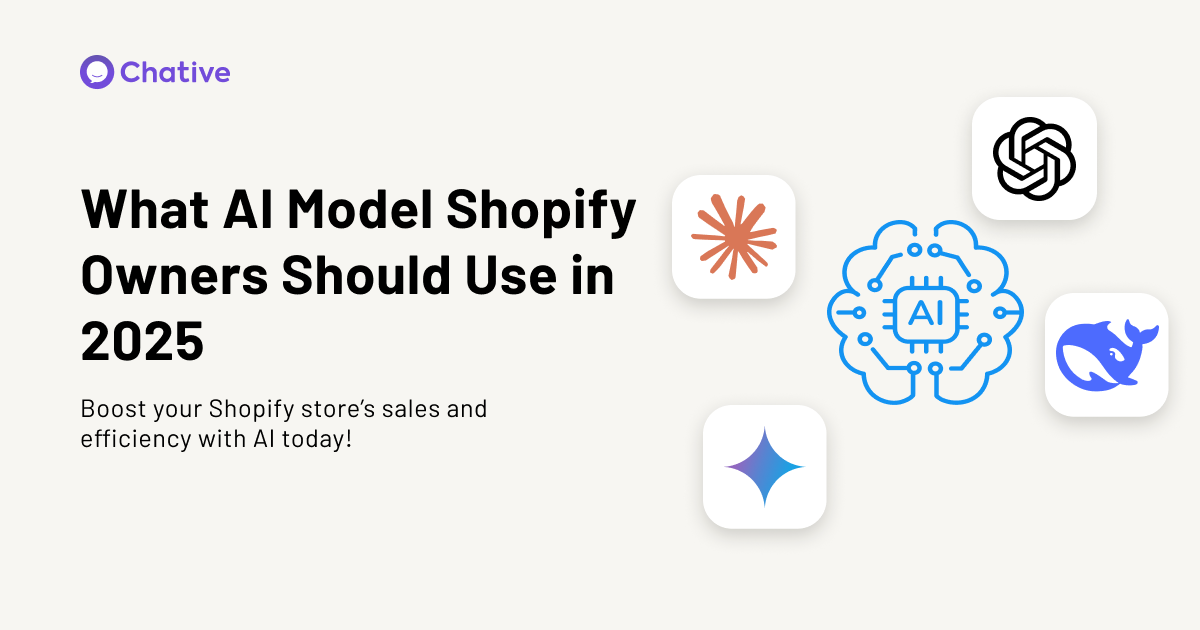In the rapidly evolving landscape of e-commerce, artificial intelligence (AI) has become a pivotal tool for businesses aiming to enhance customer experiences, optimize operations, and stay ahead of the competition.
For Shopify store owners, selecting the right AI model is crucial to harnessing these benefits effectively.
This article delves into a comprehensive comparison of five leading AI models in 2025: GPT-4, Claude, Gemini, DeepSeek, and O3 Mini, providing insights to help Shopify owners make informed decisions.
Why is AI the Key to Shopify E-Commerce?
E-commerce has evolved rapidly, and Shopify has emerged as one of the leading platforms for online business owners. However, with increasing competition and growing customer expectations, Shopify store owners must find innovative ways to personalize customer experiences, improve sales, and optimize operations.
AI is the key to unlocking these advantages. Advanced AI models help businesses:

- Enhance the shopping experience: Provide personalized product recommendations and intelligent search features.
- Optimize supply chains: Predict demand and reduce inventory costs.
- Improve customer service: Enable automated, real-time chatbot responses for better customer engagement.
5 Key Criteria for Selecting an AI Model for Shopify Stores
When selecting the right AI model for your Shopify business, it’s crucial to consider functionality, technical performance, and return on investment (ROI). Below are five essential criteria:
1. Quality of AI Outputs
The effectiveness of AI models in Shopify depends on how accurately they predict customer behavior, recommend products, and handle queries. High-quality AI should:
- Deliver accurate product recommendations based on customer browsing history.
- Provide intelligent chatbot responses that enhance customer engagement.
- Optimize product listings and descriptions for better SEO and conversions.
Example:
Google AI Gemini employs multimodal technology, analyzing both text and images to improve search accuracy and recommendation relevance.
Actionable Tip:
Choose AI models tested for e-commerce, ensuring stable and reliable performance.
2. Cost Considerations
Investing in AI for Shopify requires a careful balance between initial expenses and long-term benefits.
- Flexible Pricing: AI models like GPT-4o (OpenAI) and AWS Claude offer tiered pricing plans based on usage.
- Cost Savings: AI-powered automation can reduce customer support costs by 30% and optimize supply chains, cutting storage costs by 25% annually.
Example:
Businesses using Claude for demand forecasting experience lower inventory expenses, improving profitability.
Actionable Tip:
Don’t focus only on initial costs. Instead, evaluate long-term cost reductions and revenue growth AI can drive.
3. Speed & Response Time
Shopify customers expect fast-loading pages, instant chatbot responses, and quick search results. Delays can lead to higher bounce rates and lost sales.
- Near-Instant Responses: AI chatbots like GPT-4o handle thousands of queries in milliseconds.
- Enhanced User Engagement: AI-powered search tools powered by Gemini reduce search times by 30%, keeping customers on-site longer.
Example:
A Shopify store implementing Gemini-powered search saw a 20% increase in conversion rates due to faster product discovery.
Actionable Tip:
Choose AI models with high processing speeds, especially for chatbots, search functions, and personalized recommendations.
4. Latency & Real-Time Performance
Latency refers to how quickly AI processes and delivers results after a user’s input. Shopify owners should opt for low-latency AI models for a seamless experience.
- For Search & Navigation: Google’s Gemini is optimized for real-time product search with near-zero latency.
- For Customer Interactions: Claude AI delivers instant, context-aware chatbot responses, increasing CSAT (Customer Satisfaction Scores) by 15%.
Example:
A Shopify fashion retailer integrating Gemini for image-based search reduced product discovery time, improving UX and increasing sales.
Actionable Tip:
Ensure the AI model has low latency for real-time applications, such as search suggestions, chatbots, and inventory updates.
5. Context Window & Long-Term Memory
A larger context window allows AI models to retain more conversation history and customer data.
- For Conversational AI: GPT-4o excels in remembering long interactions, enhancing chatbot usability.
- For Business Intelligence: Claude AI analyzes seasonal sales data to predict future inventory needs.
Example:
A Shopify store using GPT-4o-powered chatbots improved customer engagement by 20%, as AI could remember past conversations.
Actionable Tip:
Choose AI models with larger context windows if you require detailed conversations, predictive analytics, or personalized customer experiences.
AI Model Comparison for Shopify Businesses in 2025
| AI Model | Key Features | Best for Shopify Owners | Impact |
|---|---|---|---|
| GPT-4o | Advanced NLP, long context memory | Chatbots, product descriptions, personalized emails | +20% in customer engagement |
| Claude | Demand forecasting, seamless AWS integration | Inventory management, AI-powered customer support | -25% storage costs |
| Gemini | Multimodal AI (text, image, voice), real-time search | Image-based search, product recommendations | +20% conversion rates |
| DeepSeek | Open-source, strong reasoning capabilities | AI automation, business intelligence | Improved decision-making |
| O3 Mini | Lightweight, fast responses, cost-effective | Small-scale automation, quick customer queries | +15% response efficiency |
Actionable Tip:
Select the AI model aligned with your Shopify business needs, whether it’s automated customer support, inventory management, or personalized marketing.
Guidelines for Deploying AI in Shopify Stores
Implementing AI in Shopify e-commerce requires a strategic approach. Follow these guidelines to maximize AI benefits:

1. Define Clear Business Goals
- Are you looking to boost sales, automate customer support, or optimize inventory?
- Identify key performance indicators (KPIs) such as cart abandonment rates, conversion rates, and support response times.
2. Choose AI Solutions Based on Budget & Scale
- Small Shopify Stores: Start with affordable AI chatbots and personalized product recommendations.
- Enterprise Shopify Stores: Invest in advanced AI-driven demand forecasting and automation.
3. Ensure Smooth Integration with Shopify
- Verify AI compatibility with platforms like Shopify, WooCommerce, and Magento.
- Sync AI models with CRM and ERP systems to streamline operations.
4. Train Teams for AI-Driven Operations
- Educate staff on managing AI chatbots, analyzing AI-generated insights, and optimizing automation workflows.
- Assign a dedicated AI manager to monitor performance metrics.
5. Optimize AI Based on Real-World Data
- Regularly track conversion rates, response times, and inventory turnover.
- Continuously update AI models with new customer data to enhance accuracy and efficiency.
Conclusion
For Shopify store owners, selecting the right AI model in 2025 is essential for scaling operations, enhancing customer experience, and maximizing revenue. Whether you choose GPT-4, Claude, Gemini, DeepSeek, or O3 Mini, ensure your AI solution aligns with business needs, budget, and long-term growth plans.
